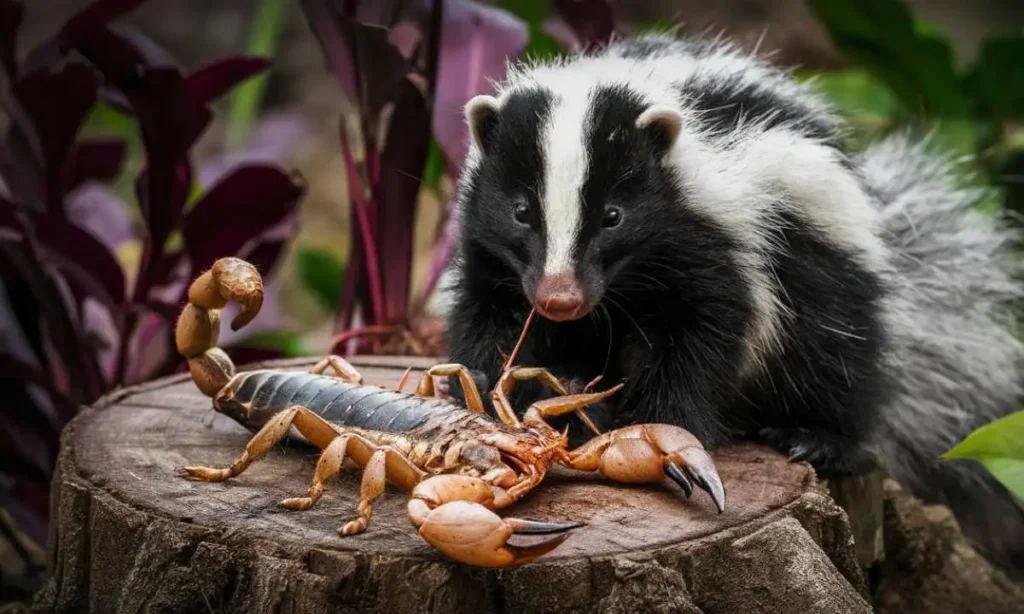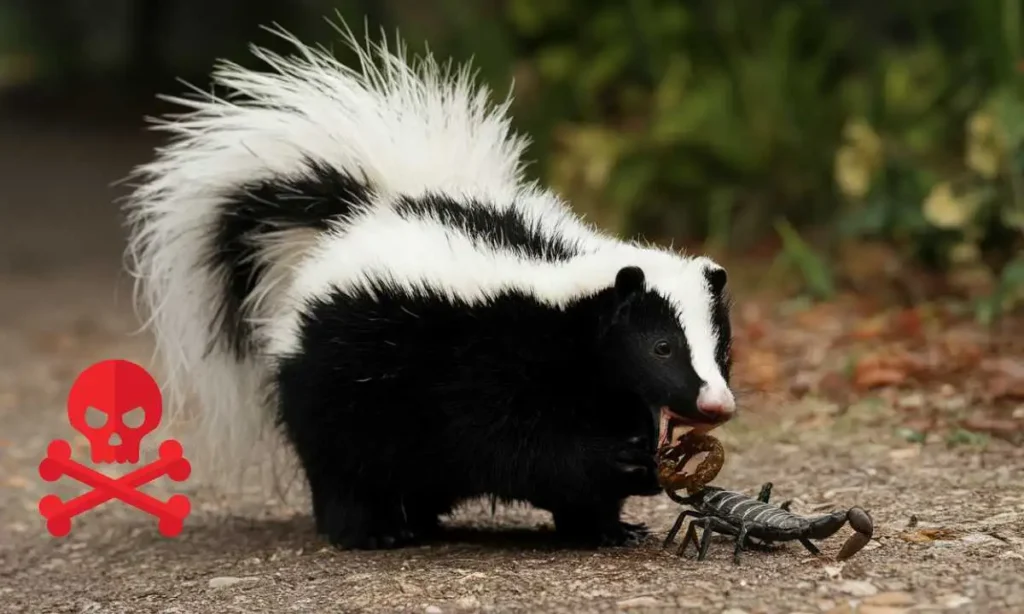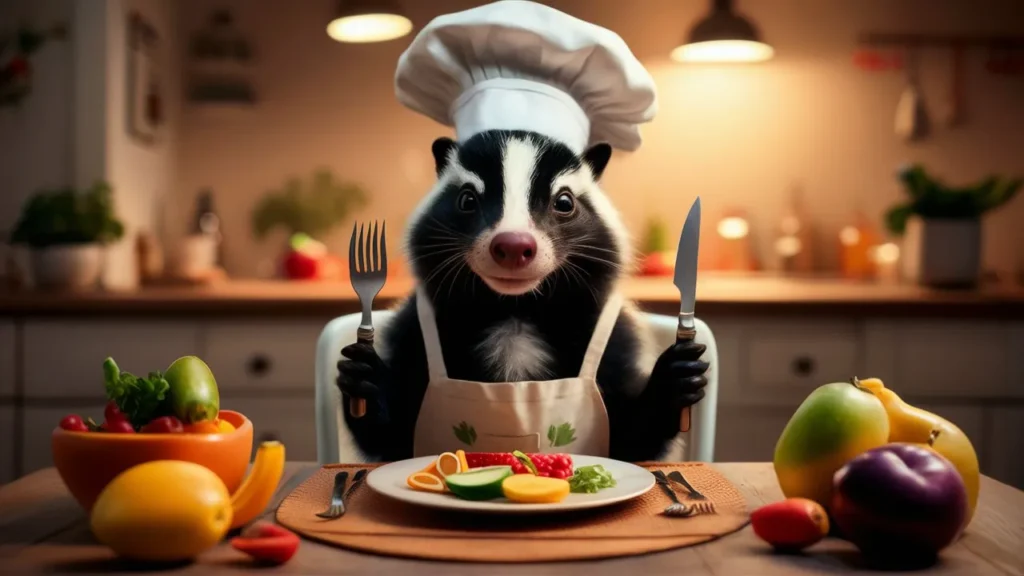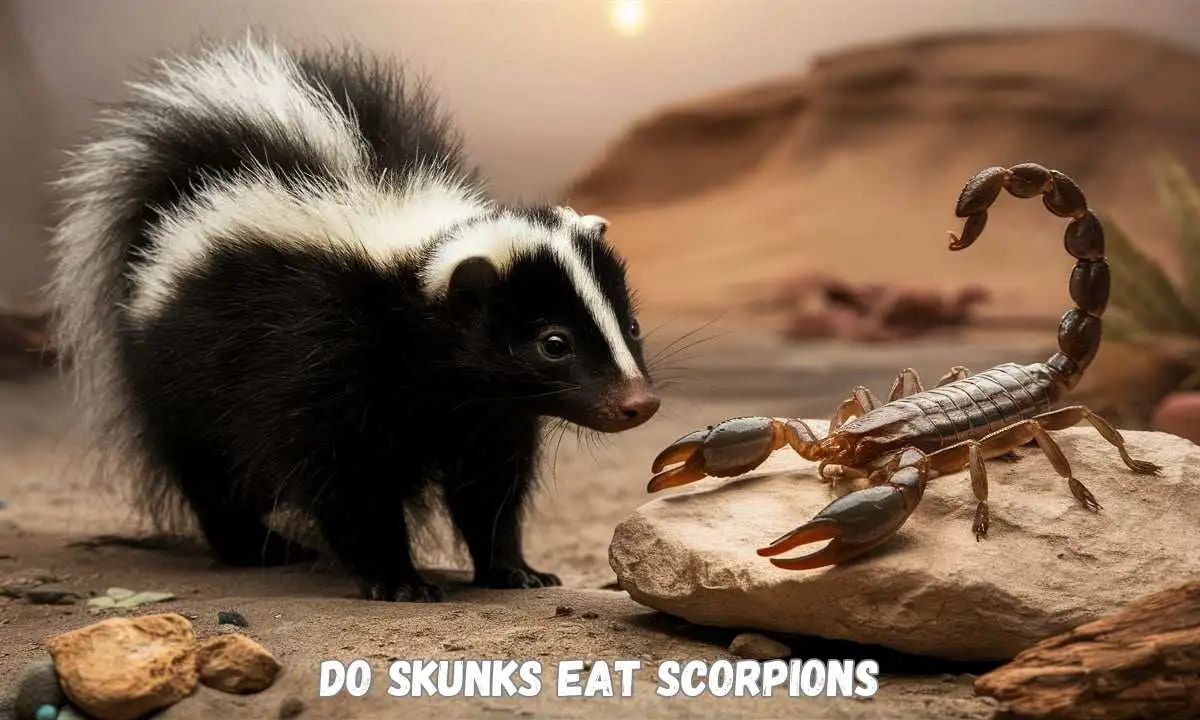Can Skunks Eat Scorpions? Vet-Approved Safety Guide
Last updated on August 11th, 2024 at 07:30 am
Yes, skunks eat scorpions! Through my research as a skunk pet owner and wildlife enthusiast, I’ve found that skunks’ diverse diets include scorpions, insects, and small rodents. Their ability to eat venomous scorpions is pretty cool, helping keep these pests in check. Want to learn how skunks do it and why they’re such helpful critters? Read on!
The Diet Of Skunks
Many people wonder, do skunks eat scorpions? The answer is yes! Skunks are not picky eaters. Their diet is quite interesting. Let’s dive into what skunks like to munch on.
General Overview
Skunks are omnivores. This means they eat both plants and animals. They have a superpower – their strong smell. This helps them catch their food. Skunks eat a lot of different things. Insects, rodents, fruits, and nuts are all on their menu. But what about scorpions? Yes, skunks eat them too. Scorpions are a good source of protein for skunks. Their strong smell and quick moves help them catch scorpions easily.
- Plants
- Insects
- Small rodents
- Fruits
- Nuts
- Scorpions
| Food Type | Examples |
|---|---|
| Plants | Leaves, berries |
| Insects | Beetles, scorpions |
| Small Rodents | Mice, rats |
| Fruits/Nuts | Apples, acorns |
Variety Of Foods
Skunks have a wide range of foods they enjoy. This helps them live in many places. From forests to cities, skunks can find something to eat. In spring and summer, they love insects and scorpions. These are easy to catch and eat. In fall, skunks switch to fruits and nuts. These help them get ready for winter. Skunks are smart eaters. They change their diet based on what’s available.
- Spring/Summer: Insects, scorpions
- Fall: Fruits, nuts
- Winter: Small rodents, leftover fruits
Skunks are not afraid to try new foods. If they find something new, they will taste it. This makes skunks very adaptable animals. They can live near humans and still find plenty to eat. Whether it’s a scorpion in the desert or an apple in a backyard, skunks can make a meal out of it.
Scorpions As Prey

Many creatures in the wild must be crafty to find food. Skunks, with their sharp senses, often surprise us with their diet choices. Among their prey, scorpions stand out. Despite the scorpion’s fierce reputation, skunks consider them a tasty meal. Let’s explore how skunks include these armored arachnids in their diet.
Scorpions In Skunk Diet
Skunks are opportunistic eaters with a varied diet that helps them thrive in different environments. They eat plants, insects, and small animals. Scorpions make an interesting part of their diet. Here’s why skunks don’t shy away from these venomous creatures:
- Immunity to venom: Skunks possess a natural immunity to scorpion venom, making them bold hunters of these arachnids.
- Nutritional value: Scorpions provide protein and fat, essential for a skunk’s health.
- Abundance: In areas where scorpions are plentiful, they become a convenient food source for skunks.
Skunks use their keen sense of smell and digging prowess to locate scorpions. They often find them under rocks or in crevices. Once found, a skunk will use its claws to capture the scorpion. Despite their dangerous stingers, scorpions stand little chance against a hungry skunk.
Hunting And Consuming Behavior
Skunks are nocturnal hunters, which coincides with the activity patterns of scorpions. They employ a combination of tactics to catch these predators:
- Stealth and speed: Skunks approach scorpions with caution, using quick movements to avoid being stung.
- Dexterity: Their nimble paws allow them to handle scorpions effectively, minimizing risk.
- Immunity: Even if stung, skunks are largely unaffected by the scorpion’s venom.
After subduing a scorpion, skunks will often consume their prey headfirst. This method helps to avoid the stinger, which, even without its venom posing a major threat, can still be mechanically harmful. Skunks’ strong jaws crush the exoskeleton, allowing them to enjoy their meal safely.
Their consumption of scorpions not only showcases the skunk’s resilience but also its important role in controlling the population of these arachnids. By preying on scorpions, skunks help maintain a balanced ecosystem.
Benefits And Risks

Skunks are known for their distinctive smell, but their diet is quite diverse. These creatures often feast on various insects and small animals, including scorpions. Exploring the diet of skunks leads to a fascinating discovery of the benefits and risks associated with their consumption of scorpions.
Benefits Of Eating Scorpions
Skunks enjoy a range of advantages when they include scorpions in their diet:
- Nutritional Value: Scorpions are a good source of protein and other nutrients essential for a skunk’s health.
- Natural Pest Control: By hunting scorpions, skunks help control their population in the wild.
- Survival Skills: Catching and eating scorpions is a survival skill that helps skunks in harsh environments where food is scarce.
Below is a table summarizing the nutritional benefits of scorpions in a skunk’s diet:
| Nutrient | Benefit |
|---|---|
| Protein | Supports growth and repair |
| Fats | Provides energy |
| Minerals | Ensures proper body function |
Potential Risks Associated
Despite the benefits, skunks face certain risks when they consume scorpions:
- Venom: Some scorpions are venomous, and their stings can harm skunks.
- Choking Hazard: Scorpions’ hard exoskeletons can pose a choking risk to skunks.
- Parasites: Scorpions might carry parasites that could infect skunks.
Consider the following points highlighting the potential risks:
- Skunks must be cautious of the scorpion’s stinger and venom.
- They need to crush the exoskeleton effectively to avoid injury.
- Regular consumption of scorpions may increase the risk of parasite transmission.
Interaction With Other Predators
Do skunks eat scorpions? Yes, they do! Skunks often hunt scorpions and other small prey as part of their diverse diet. Their interaction with other predators in this hunt for survival is fascinating. These interactions can range from competitive to opportunistic. Understanding how skunks fit into the ecosystem reveals the complex dynamics of predator-prey relationships.
Competition For Scorpions
Scorpions, as a food source, attract a variety of predators. This leads to a competitive environment where different species vie for the same prey. Skunks, with their strong sense of smell and digging abilities, are adept at hunting scorpions. They face competition from other animals such as:
- Owls: Skilled nocturnal hunters that can swoop down and catch scorpions.
- Snakes: Some species are immune to scorpion venom and actively seek them out.
- Mongoose: Known for their agility and ability to fight scorpions.
These competitors can influence the availability of scorpions for skunks. For example, a high population of owls in an area might reduce the number of scorpions, making it harder for skunks to find this prey. Skunks may adapt by changing their hunting times or seeking out different prey.
Predation Dynamics
The relationship between skunks, scorpions, and other predators is an ongoing dance of survival. Predation dynamics can be complex and are influenced by several factors:
- Availability of prey: Abundant scorpions can lead to less competition, while scarcity increases it.
- Habitat: Terrain and cover can affect hunting success for all predators involved.
- Season: Certain times of the year might see increased scorpion activity, affecting predation rates.
Skunks, with their thick fur, are somewhat protected from scorpion stings. This gives them an advantage over some predators. They also contribute to controlling the scorpion population, which can be beneficial for humans. This balance of predation ensures that no single species dominates, maintaining ecosystem health.
Adaptations And Defense Mechanisms
Have you ever wondered if a skunk would eat a scorpion? The answer is yes, they do. Both skunks and scorpions are masters of survival, equipped with unique adaptations and defense mechanisms. These traits help them thrive in their respective habitats and protect themselves against predators. Let’s delve into the fascinating world of skunk adaptations and scorpion defense strategies to understand how these creatures maintain their place in the food chain.
Skunk Adaptations
Skunks are well-known for their distinctive black and white coloring, which serves as a warning to potential predators. But their survival skills go beyond just their bold patterns. Here are some key adaptations:
- Powerful Digging: Skunks have strong, sharp claws that allow them to dig for insects and grubs, including scorpions.
- Keen Sense of Smell: They rely on their excellent sense of smell to locate food underground.
- Thick Fur: Their fur provides protection against stings and bites.
When threatened, a skunk’s primary defense is its spray. This potent weapon contains a mixture of sulfur-containing chemicals that can cause irritation and temporary blindness, allowing the skunk to escape from most predators. Skunks can aim their spray with remarkable accuracy, hitting targets up to 10 feet away.
Scorpion Defense Strategies
Scorpions are notorious for their venomous sting, which they use to capture prey and defend themselves. Here’s a look at their defense mechanisms:
- Stinger: A scorpion’s stinger delivers venom that can immobilize or kill small animals and deter predators.
- Pincers: They use their pincers to grasp prey and fend off attackers.
- Camouflage: Their coloration allows them to blend into their environment, making it hard for both prey and predators to spot them.
Scorpions also have a tough exoskeleton that provides protection from physical harm. When faced with a threat, they can quickly scurry away to hide under rocks or in crevices. Despite these defenses, skunks are one of the few predators with the adaptations to handle scorpions effectively, making them a part of the skunk’s diverse diet.
Conclusion And Future Research

Our journey into the diet of skunks has led us to some fascinating insights. We’ve seen how these creatures navigate their world and what they choose to snack on. A pressing question we explored was whether skunks eat scorpions. This section wraps up our findings and looks ahead to what we still need to learn.
Summary Of Findings
Our research into the skunk’s diet has unveiled some interesting truths. Skunks are indeed opportunistic eaters with a varied diet. Key points from our study show:
- Skunks do eat scorpions, despite the risk of stings.
- They have a natural resistance to toxins, which includes scorpion venom.
- Seasonal availability and regional differences impact their food choices.
The data we collected is summarized in the table below:
| Food Item | Season | Frequency of Consumption |
|---|---|---|
| Scorpions | Spring-Summer | Occasional |
| Insects | All Year | Common |
| Small Rodents | Varies | Rare |
These findings suggest a flexible diet but confirm that scorpions are indeed part of it.
Areas For Further Study
While we now know skunks eat scorpions, our understanding is far from complete. Future research could expand our knowledge in several ways:
- Long-term studies to assess how diet affects skunk health and lifespan.
- Investigation into the role of scorpions in their ecosystem.
- Examination of skunks’ hunting techniques and how they handle different prey.
These are the suggested next steps for research:
- Track a population of skunks over several seasons to note any dietary shifts.
- Study the interaction between skunks and scorpions in controlled environments.
- Use technology to observe skunk foraging behavior in the wild.
Such studies will fill gaps in our understanding of these intriguing creatures.
Frequently Asked Questions
Skunks primarily eat beetles, grasshoppers, crickets, and other insects. They also consume larvae and grubs, which they dig for underground.
The main predator of skunks is the great horned owl. These owls, largely immune to skunk spray, prey on skunks during the night. Other predators include coyotes, bobcats, and foxes, which may attack skunks but are more cautious due to the skunk’s defensive spray.
Skunks primarily enjoy eating insects, grubs, and earthworms. They also consume small rodents, fruits, nuts, and plants as part of their diet.
Conclusion
Wrapping up, the diet of skunks is indeed diverse, including pests like scorpions. This fact highlights nature’s intricate food web and the role skunks play in it. Remember, their eclectic eating habits are essential for ecological balance. Keep exploring the animal kingdom for more surprising insights!

